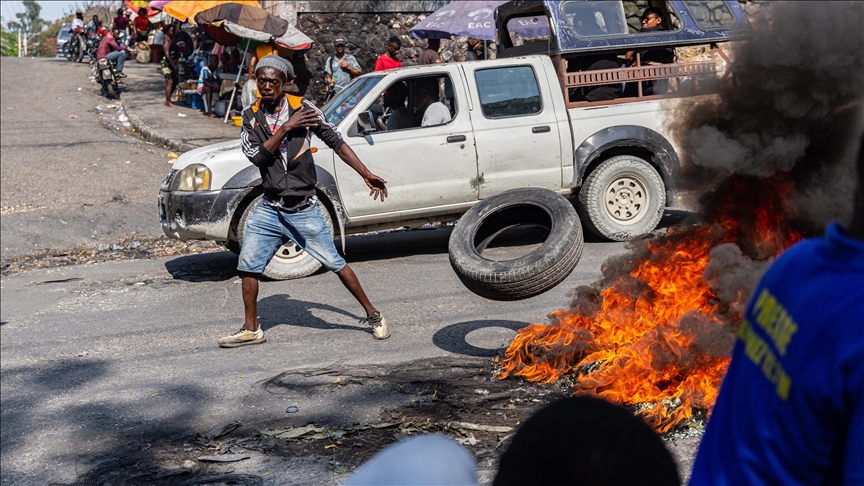Power vacuum, spiral of violence deepen Haiti's crisis
11M Haitians face famine, with 15,000 fleeing homes in past week and over 1,200 deaths in violence this year

BOGOTA, Colombia
Haiti, one of the poorest countries in the Americas, is on the brink of economic collapse due to gang violence and a power vacuum.
Struggling with basic problems such as political, economic and security crises for many years, Haiti is in danger of famine with a population of more than 11 million.
According to the United Nations International Organization for Migration data, 15,000 people left their homes in the last week, while more than 1,200 people have lost their lives in incidents caused by gang violence since the beginning of the year.
According to experts, there are nearly 200 armed gangs in Haiti, mostly based in the capital Port-au-Prince.
The gangs, which control 80% of the capital, frequently clash with security forces.
Haiti, whose economy and infrastructure collapsed after suffering two major earthquakes in the last 14 years, entered a power vacuum with the assassination of President Jovenel Moise on July 7, 2021.
Prime Minister Ariel Henry, who took all the powers after Moise's death, could not find a solution to the unrest and public disappointment in the country and could not prevent the further escalation of violence.
After Moise's assassination, crime, theft, extortion and gang warfare peaked in the country.
The failure to hold elections, despite Henry's repeated promises, led to a wave of protests in the country.
Prison raid by gangs
Gangs carried out armed attacks on two prisons near Port-au Prince and Croix des Bouquets on March 2 and 3 that led to the escape of more than 4,500 prisoners and the death of 12 people.
Most of the escapees, dubbed "dangerous prisoners," were imprisoned for kidnapping, murder, extortion, and membership in illegal gangs.
Although the government declared a 72-hour state of emergency on March 4 to apprehend the prison escapees, it was extended to a month after the incidents could not be brought under control.
The gangs, who had been engaged in bloody clashes with each other until recently, cooperated before the prison raid, according to local media reports.
The absence of parliamentary and general elections in the country since 2019 has allowed the gangs to gain more influence.
'Barbecue' biggest gang behind violence
Jimmy Cherizier, nicknamed "Barbecue", is considered one of the "most powerful" armed gang ringleaders in the country, who has "openly" threatened Prime Minister Henry, warning of civil war if he does not resign.
Cherizier, a former policeman and ringleader of the G-9 gang, who was dismissed from his job for his crimes, gathered nine armed groups to overthrow the Henry government.
In a statement on March 6, Barbecue, who caused thousands of prisoners to escape from prison, said that if Henry did not resign, "Haiti will either be heaven for everyone or hell for everyone."
Cherizier organized simultaneous attacks on police stations, ministries, and the international airport in an attempt to force the Henry government to resign.
The G-9 gang members were repelled by police after several people were killed on both sides.
Henry, who was in Nairobi at the time of the gang attacks, had reached an agreement with his counterparts to bring a Kenyan-led multinational security force to the island.
Premier Henry's resignation
On March 6, Henry's plane, which was due to return to Haiti from Kenya, where he had left on March 1, was forced to land in Puerto Rico due to clashes between security forces and gangs at the airport.
Unable to withstand further internal and external pressure after law enforcement failed to ensure public safety in the fight against gangs, Henry announced his resignation on March 11.
Following the escalation of violence in Haiti, the EU announced the evacuation of its personnel on March 11.
The US Embassy in the country also called on its citizens to leave Haiti.
The neighboring Dominican Republic deployed troops to the border and announced that Haitians would be punished "harshly" if they entered the country illegally.
*Writing by Muhammed Yasin Gungor in Istanbul
Anadolu Agency website contains only a portion of the news stories offered to subscribers in the AA News Broadcasting System (HAS), and in summarized form. Please contact us for subscription options.

